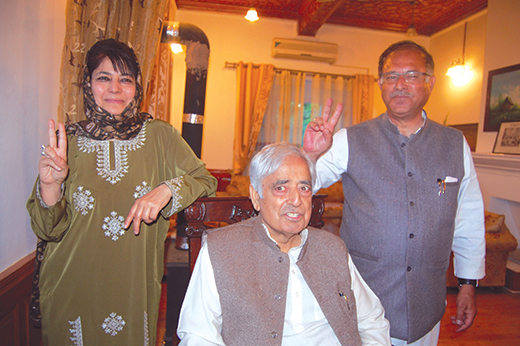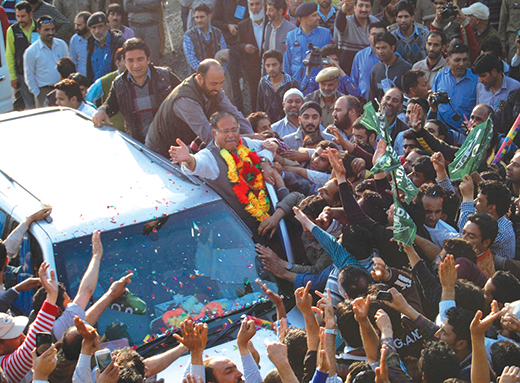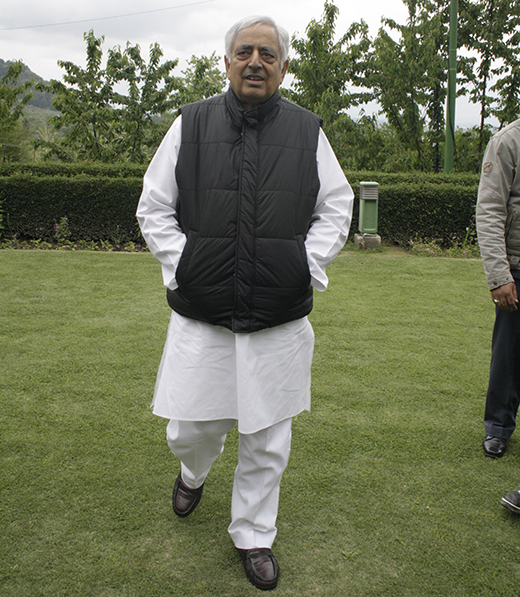Wresting all the three Lok Sabha seats from NC in Kashmir, ensuring Congress’ defeat for the twin Jammu seats, Mufti Sayeed left only Ladakh for the ruling coalition to fight with each other. From the days of street sloganeering that ‘Muftien Kabar, Kashierie Neabar’ to the days when he refused to be Kashmir’s 21st century Yusuf Shah Chak, R S Gull explains the rise of Mufti at the fag end of his political career

Pic: Bilal Bahadur
On Friday when the Lok Sabha polls verdict became public, the only commonality that one could feel between a gloomy G-1 and the ecstatic Fairview Guest House, the erstwhile Papa-II: neither Dr Abdullah came out to see media nor Mufti Sayeed. But both the veterans had different reasons: Dr Abdullah, the scion of the powerful Sheikh family, had lost for the first time in his political career and Mufti had won a landslide victory for the first time in history.
Dr Abdullah’s National Conference (NC) that had been part of most of the post-partition history is, already squeezed to Kashmir by alliance politics, is finding itself in a quandary over the verdict. In comparison, Mufti who founded his PDP on the ruins of strife has now genuinely staked his claim to the regional party status. PDP does exist on both sides of the Pir Panchal unlike NC that is finding hard to have a respectable address in Kashmir. This is despite the fact that politics lacks irrelevance.
For Mufti, who is already 78, managing such a turnaround in Kashmir has not been so easy. Right now, if one goes by Congress state president Saif ud Din Soz, if it was hate-NC wave that helped PDP is taken at its face value, it also requires a lot of capacity to consolidate it.
Mufti’s life has been a continuous struggle to be what he has emerged finally. After briefly practicing law, he emerged on the political scene in the days when Sheikh Abdullah was jailed by Nehru in 1953. For the first time, Mufti was elected unopposed to the state assembly in 1962 in those botched up democratic exercises. In 1967, he was again in the assembly taking the same route and this time a Deputy Minister for Agriculture. He soon resigned and bounced back as Works Minister in Mir Qasim’s cabinet in 1972. Between 1972 and 1975, Mufti was member of the state legislative council.
After Indira Gandhi managed peace with Sheikh who had spent 22 years in wilderness, Mufti got the key assignment as heading Congress’s state unit – a position he retained for 12 years. That is the era when Mufti actually emerged as the ‘villain’ in Kashmir politics. By then, he had evolved his own theory of keeping the state stable by having a strong opposition within the unionist camp, an idea that is still dearer to him.
It was in this capacity that he overthrew Sheikh as Chief Minister by withdrawing the Congress support forcing a new election. Later, after Sheikh’s demise, he was the key to force a collapse of Dr Farooq Abdullah’s government that was set up with a popular vote in wake of Sheikh Abdullah’s demise.
Playing an opposition leader as head of a party that was most hated at ground zero, Mufti faced the indignities in a totalitarian space. Then, Congress was packaged as ‘the gutter worms’. Mufti would be greeted by slogans like ‘Muftien Kabar, Kashiere Neaber’. Post-1975, he contested many elections but could never made to the state assembly. His next destination was Delhi.
In 1986 Mufti became a Rajya Sabha member and Rajiv Gandhi inducted him as his Tourism Minister. A year later, Mufti put in his papers apparently in protest against the Rajiv-Farooq accord. He also gave up his Rajya Sabha position. Mufti joined his friend V P Singh led Jan Morcha and successfully contested Lok Sabha election from Muzaffarnagar in 1989. It was the peak of his political career when Singh appointed him India’s first Muslim Home Minister of the BJP-supported Janta Dal government, a position in which he was tasked to handle Kashmir that had erupted in a rebellion. Though he was Home Minister only for 11 months, NC is increasingly accusing him for the crisis and holding him responsible for the tragedies that Kashmir witnessed. It also includes appointing Jagmohan as governor of the state against the wishes of the then Chief Minister Dr Farooq Abdullah.
Mufti took many years in silence, shuttling between Srinagar and Delhi and finally mends his fences with Congress. Soon his status of PCC chief was restored that saw the re-introduction of Mufti to the new generation of Kashmir. Mufti regrouped Congress at a time when political culture had almost disappeared from insurgency ravaged Kashmir. In 1995, Mufti made it to the Rajya Sabha from his home Islamabad as his daughter Mehbooba Mufti won the same seat for state legislature in the assembly election in 1996. At one point of time, they were the only two politicians who would operate in Kashmir. They would go from door to door and console the families of slain people, the only political process they could think of. It would get Ms Mufti the slang of being Kashmir’s Rudaali (professional weeping women).

Pic: Bilal Bahadur
It was in their capacity as the main faces of Congress that the father-daughter claimed they pleaded for a better pro-people Kashmir policy in the party before the Congress Working Committee but failed. It was in the aftermath of it that PDP was floated in July 1999 after Muftis’ resigned Congress. For PDP, Mufti pulled out a bunch of workers, got a few free floating electrons and later got established politicians like Molvi Iftikhar Hussain Ansari, Mohammad Dillawar Mir and Rafi Ahmad Mir from the ‘treasury benches’. Besides, he evolved the party flag in full green with pen-and-ink-pot as its symbol – the symbol on which the Muslim United Front (MUF) contested the most bungled election in 1987.
NC, however, has a different story of PDP’s origins. But they started talking about their theory only after they felt Muftis’ unleashing themselves on Kashmir – highly mobile, almost omnipresent at places that witness mayhem and casualties.
In 2002 elections, it paid PDP handsomely. It bagged 16 seats and finished second in eight segments. Against Jammu where it got only 1.76 per cent of vote share, PDP finished second with 24.51 percent vote share after NC in Kashmir. But PDP getting less than 10 per cent of a total of over 2.6 million votes polled across J&K did not debar it from sharing power with others in a hung house. Mufti bonhomie with Congress lasted only three years but that was the period in which he started creating the party and giving it a credibility that is still with him.
Revocation of POTA, assimilating the SOG into the executive police, a bit of accountability and better communication skills were the basics in Muftis basket. Within days he came with his economics and changed the entire fiscal infrastructure of the system. Healing touch apart, Mufti, however, presided over the death of a crucial bill involving domicile rights of the women marrying non-locals. Though he had the backing of opposition, his ally, the Congress made him to change the course of the crucial legislation, something that is lost for ever.
 Apart from staking claim over making Prime Minister Atal Bahrai Vajpayee extend a hand of friendship to Pakistan from Srinagar, PDP started hawking reopening of road to Muzaffarabad to an extent that people started cracking jokes over the officially installed milestones. But it finally took place in April 2005 when Dr Manmohan Singh flew to Srinagar with Mrs Sonia Gandhi with a green flag for the bus.
Apart from staking claim over making Prime Minister Atal Bahrai Vajpayee extend a hand of friendship to Pakistan from Srinagar, PDP started hawking reopening of road to Muzaffarabad to an extent that people started cracking jokes over the officially installed milestones. But it finally took place in April 2005 when Dr Manmohan Singh flew to Srinagar with Mrs Sonia Gandhi with a green flag for the bus.
But the single major thing that PDP retained as its core achievement was the difference it made on the civil liberty front. Whether or not the cross-LoC bus moves, the memories of the ‘change’ shall remain with the people for some more time.
After three years when Congress forced a change in the leadership of the coalition, Mufti did not stop. He made de-militarization a major issue and started a series of negotiations with the Prime Minister directly. There were debates, assurances and deadlines. But everything came to knots when Amarnath land row dictated a new chapter in Kashmir’s unrest. Though the crisis was partly the outcome of PDP, that shared the government with Azad, it was quick to create a situation in which it pulled down the government. For right or the wrong reasons, it fetched PDP a new benchmark that it has courage to give up power.
In 2008 polls, PDP ended up improving its tally to 21 seats besides becoming the runner up at 18 assembly segments. But its failure to dissuade the next generation of Gandhis’ created a situation that Rahul shook hands with Omar and he got six year leadership to a coalition. This was despite the fact that PDP was the most voted party in Kashmir. It improved its overall vote share.
Politics requires a lot of patience and Mufti seems to have enough of it. He started building the party brick by brick. As everybody ridiculed his wisdom of keeping the gate open for all the shady people, he never felt insulted. He kept his doors open for everybody because he needed men. As the crowds surged, PDP was more visible. It happened without diluting any bit of what he thinks for his politics, party and Kashmir.
The first delivery was the just concluded Lok Sabha election in which he run riot from all sides. He fielded his daughter from south and his two finance ministers from two other constituencies. From Jammu, he fielded Yashpal Sharma and Arshad Malik from Udhampur. Unlike NC, Mufti made Kashmir related issues of bread and butter a major poll issue. That proved a fundamental difference, something that even Omar admitted post-defeat.

Given the prevailing hate-NC wave across Kashmir, he got all the three seats in Kashmir. His single biggest achievement is that Tariq Hamid Karra made Dr Farooq Abdullah to lose for the first time. He is now a giant killer. In Kashmir, where 1153483 voters came to the polling station, PDP got 533629 votes – making 46.26%.
In Jammu region where it fielded two candidates, despite knowing that it is not winning, it got 199015 votes. From across state, it got 20.5% of the votes. Had it been an assembly election, there were more seats with PDP than with NC. Right now his party has won in 39 of the 46 seats and at least one in Jammu. For ruling J&K, only 44 berths in a 87 member house are required.
PDP had worked a lot in Jammu before fielding the candidates. For last many years, Muftis’ had made Poonch-Rajouri as their second winter home. They would visit smaller villages in the region. With NC restricted to Kashmir and its base in the Pir Panchal region unwilling to align with the Congress PDP became a natural alternative. That played a key role in defeating Congress in the region. Same was true to larger extent in Chenab Valley where it lacks a better base.
If one goes by what Omar Abdullah said, the Lok Sabha results are going to have an impact on the forthcoming assembly elections. With Omar’s ‘say’ in Delhi gone for the next five years, he will face a lot of heat both from his ally Congress as well as PDP. Kashmir’s Capricorn bridge-player apparently will most possibly have the last laugh.















